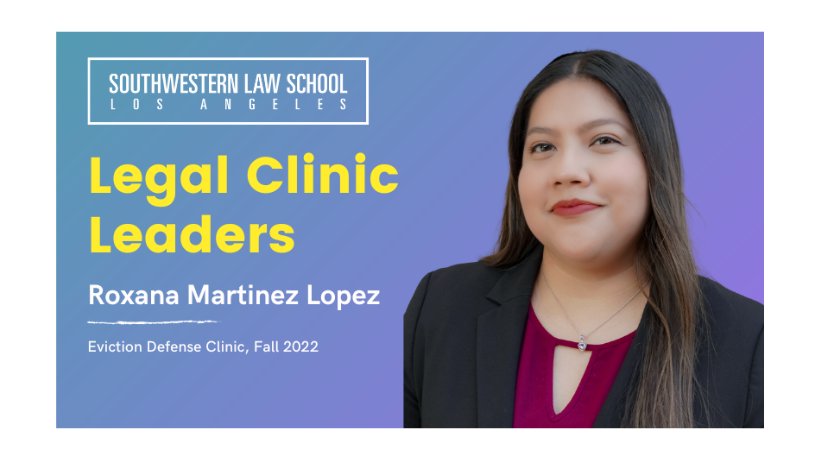SWLAW Blog | Future Students

May 4, 2023
Legal Clinic Leaders Series — Roxana Martinez Lopez
Meet the students who work directly with and in the community to provide quality legal representation to underserved individuals through our Legal Clinic Leaders blog series. We're excited to spotlight these all-star advocates and showcase the many different fields of law you can explore through our legal clinics and the wide range of opportunities available at Southwestern to gain practical lawyering skills. We hope their experiences will inspire YOU to join a legal clinic.
Meet 3L Roxana Martinez Lopez
- Eviction Defense Clinic, Fall 2022
Why did you decide to participate in a clinic?
I was motivated to be a part of this clinic because my family and I have experienced housing rights violations, and I wanted the opportunity to assist someone who may be facing a similar experience. This Covid-19 pandemic has left many people without an income and resources, and now more than ever, vulnerable communities need housing representation.
What stands out about your clinic experience?
Before this clinic, I was interested in Real Property Law but was not conscious of how I could pursue that area while providing legal services to low-income BIPOC communities. The Eviction Defense Clinic allowed me to learn more about the law surrounding tenants' rights, which I am now considering pursuing after law school. Additionally, I gained a better understanding of what it looks like to be a relentless advocate for your client. The cases and stories I learned about demonstrated how attorneys can be a safeguard and support system for clients susceptible to legal and language barriers during difficult times. This was exemplified by the representation that Professor Vargas and Professor Wenger provided to their clients.
What skills and knowledge did you learn from your clinic experience?
I learned that eviction proceedings move on an extremely fast timeline and are against a tenant's best interest. The process and its deadlines place an unrealistic and unfair responsibility on a tenant to figure out alone. Tenants have been prejudicially placed in a situation where they face an eviction case against them compounded by health and income insecurity brought on by the Covid-19 pandemic. Additionally, the clinic emphasized the importance of trauma-informed lawyering skills. Attorneys representing low-income BIPOC communities should be mindful of their client's experiences and do their best to make them feel protected. This is important because many of the clients we learned about had experienced some form of trauma, often due to their life intersections.
What do you think helped take you from student to advocate?
What helps a student become an advocate is realizing that we are never done learning and that sometimes we must get involved in all aspects of our role as an advocate. This includes learning about your client and the social forces that serve as obstacles to your client. Advocates should learn about their client to obtain the best long-lasting outcome for them. For example, an attorney may have to take on many roles to be an effective advocate for a tenant. I have witnessed that the roles of an eviction defense attorney include being a negotiator, a supportive resource, and even a policy maker/changer.
What words of advice would you have for future clinic students?
My advice would be to acknowledge the privileged position we are in as law students and learn that to build legal change, we need to work alongside the most vulnerable communities who are often initiating that change.
Please provide an inspiring anecdote from your clinical work experience.
Along with other community efforts for equitable housing, we learned about the Moms 4 Housing group, a collective of homeless and marginally housed mothers who decided to come together to repossess housing units for their Oakland community. The mothers and their children occupied a vacant, investor-owned home. The mothers have called attention to the lack of affordable housing in their city when many vacant homes exist that could help alleviate the need but are unattainable because they are incredibly high priced and owned by big banks. Community representation like this group is necessary when our financial system doesn't work for low-income BIPOC communities.
Interested in learning more about the legal clinics? Visit our Clinics page here.